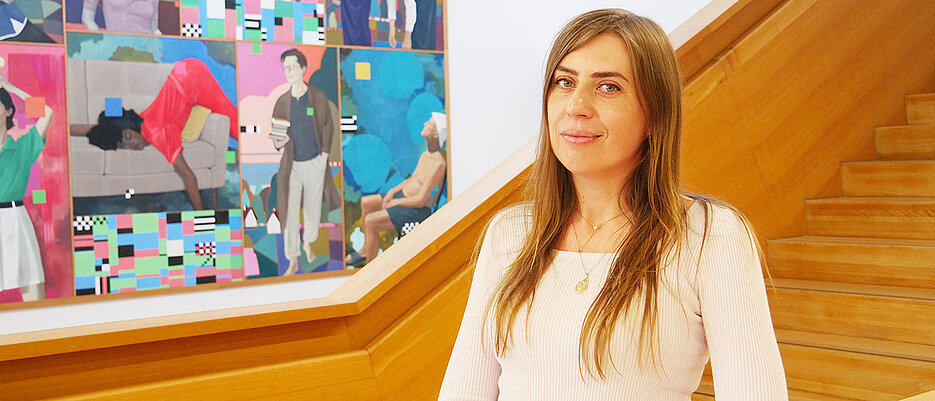How Alien Aquatic Plants Infiltrate Native Ecosystems
10/07/2025Dr. Mariana Prokopuk studies invasive aquatic plant species and their adaptation to new habitats. She is currently at the University of Würzburg on a Coimbra Group scholarship.

Aquatic plants provide habitat for numerous animals, have a positive effect on water quality, and indicate how intact an ecosystem is. If the balance of these plant species changes, for example if some disappear and others proliferate, this often indicates profound changes in the water body.
This is precisely where Dr. Mariana Prokopuk's research comes in. She works as a research fellow at the National Academy of Sciences of Ukraine (Institute for Evolutionary Ecology, Kyiv). The Ukrainian scientist is currently visiting Professor Christian Hof, head of the Chair of Global Change Ecology at Julius-Maximilians-Universität Würzburg (JMU). Her stay is made possible by a scholarship from the Coimbra Group, a network that promotes academic cooperation.
Dedicated to Invasive Aquatic Plants
In her research, the scholarship holder is investigating the spread of so-called invasive alien aquatic plants. These are plants that have been introduced – intentionally or unintentionally – from their native habitat to other regions. Some of these species spread very quickly, displacing native plants and causing considerable ecological damage – such as water hyacinth or Kariba water fern.
“I am particularly interested in how alien aquatic plants establish themselves in new habitats,” says Prokopuk. The focus is on the behavior of the plants, their preferred habitats, and their response to environmental changes. The aim is to better understand how adaptable these species are and what risk they pose to native ecosystems.
She is concentrating on three species from the frogbit family (Hydrocharitaceae): Egeria densa from South America and Elodea nuttallii and Elodea canadensis from North America. These three waterweed species live underwater and have spread widely in European inland waters.
Taking a Closer Look at Canadian Waterweed
Prokopuk has already conducted comparative studies on the occurrence of Elodea canadensis – also known as Canadian waterweed – in Portugal and Ukraine: “The difference between nutrient-poor, higher-altitude lakes in Ukraine and nutrient-rich, lower-altitude watercourses in both countries was particularly striking,” says the scientist. In the latter, the plants have longer shoots and broader leaves.
This suggests that Canadian waterweed adapted to foreign ecosystems. However, this adaptation has its limits: “Human-induced nutrient enrichment is likely to lead to the decline or even disappearance of Canadian waterweed,” says the ecologist.
During her stay at JMU, Prokopuk is actively engaged in field research: she has already studied several lakes near Karlsruhe and the River Main. She also spent time in Iffeldorf (Bavaria) at the limnological station of the Technical University of Munich.
“Mariana Prokopuk's work on the occurrence and characteristics of invasive aquatic plants fits in very well with our research on the ecology of global change,” said the JMU host. The scientist's expertise in freshwater habitats complements the chair with an important perspective, as its focus is primarily on rural ecosystems.
About the Coimbra Group
Forty European universities have been working together in the Coimbra Group since its foundation in 1985. Its scholarship program gives international scientists the opportunity to gain experience in the scientific community of another university and to establish academic contacts.
JMU participates in the Coimbra Group Scholarship Program. It funds scholarships in two funding lines: the “Scholarship Program for Young African Researchers” and the “Scholarship Program for Young Researchers from the European Neighbourhood.”
Contact
The Coimbra Group representative at JMU is Doris Fischer, Vice President for International Affairs and Alumni; the contact person for the Coimbra Group Scholarship at JMU is Merle Bollmann, merle.bollmann@uni-wuerzburg.de






